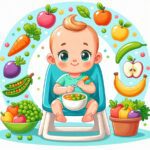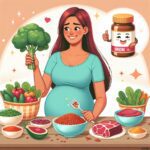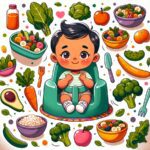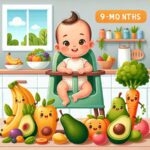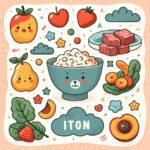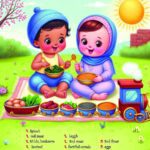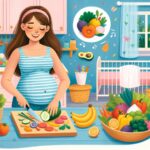Pregnancy nutrition for vegetarians? It seems like a daunting task at first, but fret not! Ensuring you and your baby receive all the necessary nutrients during pregnancy is entirely feasible on a vegetarian diet. This guide dives deep into how vegetarians can optimize their pregnancy nutrition, focusing on essential nutrients, dietary recommendations, and how to overcome common challenges. Whether you’re a lifelong vegetarian or considering a plant-based diet during pregnancy, this article provides the insights you need for a healthy, nutrient-rich pregnancy journey.
Understanding the Basics of Pregnancy Nutrition for Vegetarians
The cornerstone of a healthy pregnancy for vegetarians, as for any expectant mother, revolves around consuming a well-balanced diet that supports both maternal health and fetal development. Pregnancy nutrition for vegetarians? It’s not only possible but can be richly rewarding and beneficial. Essential nutrients like protein, iron, calcium, vitamin D, and omega-3 fatty acids can all be found in a vegetarian diet, with a little planning and knowledge.
It’s vital to understand the role of these nutrients in pregnancy. Protein supports the baby’s growth, iron helps prevent anemia, calcium and vitamin D are crucial for bone development, and omega-3 fatty acids aid in the baby’s brain development. Vegetarians can obtain these nutrients from sources like legumes, fortified cereals, leafy green vegetables, nuts and seeds, and dairy products (if lacto-vegetarian). According to the National Institutes of Health, careful planning and possibly supplementation can ensure a nutritionally adequate pregnancy diet.
Pregnancy Nutrition for Vegetarians? A Deep Dive into Key Nutrients
When considering pregnancy nutrition for vegetarians, it’s crucial to focus on specific nutrients that might be more challenging to obtain in sufficient amounts from a plant-based diet. Iron, for instance, is found in two forms: heme (animal-based) and non-heme (plant-based). The body absorbs heme iron more efficiently, but vegetarians can enhance non-heme iron absorption by pairing iron-rich foods with vitamin C-rich foods.
Protein is another nutrient often questioned in vegetarian diets. However, by incorporating a variety of protein sources such as lentils, beans, tofu, and quinoa, vegetarians can easily meet their protein needs during pregnancy. Additionally, sources of omega-3 fatty acids, such as flaxseeds, chia seeds, and walnuts, are vital for neural development and should be included in daily meals.
Meal Planning and Supplementation Strategies
Successful pregnancy nutrition for vegetarians often comes down to strategic meal planning and, in some cases, supplementation. A common concern is obtaining enough vitamin B12, which is primarily found in animal products. Vegetarians, especially those who are vegan, should consider B12 supplements or fortified foods to meet their needs. Similarly, vitamin D and calcium are critical for bone health, and supplements may be required if dietary intake is insufficient.
Meal planning can also make a significant difference. Incorporating a variety of foods ensures a wide range of nutrients. For example, a breakfast of fortified oatmeal with berries and flaxseed offers fiber, omega-3s, and iron. A lunch of lentil soup with a side of orange slices can boost iron absorption, while a dinner of tofu stir-fry with vegetables on brown rice provides protein, vitamins, and minerals. Remember, hydration is also key during pregnancy, so aim for at least 8-10 glasses of water daily.
Overcoming Common Vegetarian Pregnancy Nutrition Challenges
While it’s entirely possible to maintain a healthy vegetarian diet during pregnancy, certain challenges may arise. Concerns about protein intake can be addressed by being mindful of incorporating a variety of protein sources into daily meals. For those worried about iron, consuming iron-rich plant foods alongside vitamin C sources can enhance absorption. If faced with nausea or food aversions, focusing on bland, easy-to-digest meals can help maintain nutrient intake.
Finally, staying connected with a healthcare provider to monitor nutritional status throughout pregnancy is crucial. They can offer personalized advice and recommend blood tests to ensure nutrient levels are adequate. This proactive approach ensures both the mother’s and baby’s health are prioritized, making pregnancy nutrition for vegetarians not just feasible but thriving.
In conclusion, pregnancy nutrition for vegetarians requires attention to detail and a commitment to balanced meal planning. By focusing on essential nutrients, considering supplementation when necessary, and adopting strategic meal planning, vegetarians can enjoy a healthy and nutritious pregnancy. Remember, every pregnancy is unique, so it’s essential to consult with a healthcare provider to tailor dietary recommendations to your specific needs.


